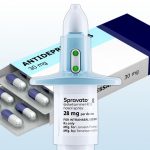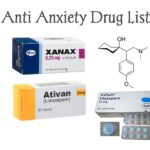How Good is Esketamine For Anxiety?

According to the American Psychological Association (APA), anxiety is an emotion characterized by feelings of tension, worried thoughts, and physical changes like increased blood pressure. Anxiety disorders are the most common mental disorders in the United States, according to the National Institute of Mental Health. One-third of people will experience an anxiety disorder during their lifetime, they report. However, they remind people that there are effective treatments and that research is developing new ones. They urge people who think they might have an anxiety disorder to seek treatment and information immediately.
Anxiety disorders can bring many biological and psychological symptoms that affect your general health. However, the right treatment combined with regular exercise, a healthy diet, and stress reduction techniques can help you regain your sense of well-being. The Anxiety and Depression Association of America reports that for most people, both symptoms and quality of life improve once they get treatment.
What Is Esketamine And What Does It Treat?
Esketamine is an intranasal medication that works in the brain. Esketamine is made from a drug called ketamine, an anesthetic that has also been used for many years to treat depression. But it wasn’t until recently that esketamine, a more potent version of ketamine, earned FDA approval specifically for use as a nasal spray for those with treatment-resistant depression.
Esketamine is approved for the treatment of treatment-resistant depression (TRD) in conjunction with an oral antidepressant. It is also FDA approved for major depressive disorder (MDD) with suicidal thoughts and behavior.
Esketamine is used in combination with other antidepressants when at least two other treatments have failed to treat depression.
Symptoms of depression include:
• Depressed mood – feeling sad, empty, or tearful
• Feeling worthless, guilty, hopeless, and helpless
• Loss of interest or pleasure in your usual activities
• Sleep and eat more or less than usual (for most people it is less)
• Low energy, trouble concentrating, or thoughts of death (suicidal thinking)
• Physical aches and pains such as headaches, stomach issues, or muscle pains
• Psychomotor agitation (‘nervous energy’)
• Psychomotor retardation (moving and thinking in slow motion)
• Suicidal thoughts or behaviors
How does Esketamine work to treat depression?
Esketamine, and its related drug ketamine, are highly effective depression treatments for a number of reasons:
• Esketamine’s antidepressant function works through a different mechanism than other drugs. Conventional antidepressants increase levels of naturally occurring chemicals such as serotonin, norepinephrine, and dopamine. These chemicals are messengers that relay communication between brain cells. The theory is that having greater quantities of these neurotransmitters allows for better communication between brain cells and positively affects mood.
• Esketamine works in a similar fashion, but unlike other antidepressants, it increases levels of glutamate, the most abundant chemical messenger in the brain. The result? A greater impact on more brain cells at one time.
Can I take esketamine for anxiety?
Although esketamine has been used in some studies involving depressed patients with anxiety and recorded good results, the medication does not have anti-anxiety effects according to current evidence. In fact, using esketamine can cause anxiety or feeling disconnected from your body, thoughts, emotions, space, and time. However, ketamine (a drug similar to esketamine) has been studied for use in treating anxiety disorders.
What are some medical and psychiatric issues that make esketamine unsafe?
In some cases, esketamine can lead to small increases in blood pressure or heart rate. Patients who have certain arrhythmias, uncontrolled blood pressure, or a history of coronary incidents or stroke may not be candidates for ketamine infusion. We medically and psychiatrically screen all of our patients. We also do not administer esketamine to patients who are pregnant or have dementia.





